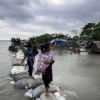Ignoring biodiversity conservation will cost us

Climate change is severely affecting natural resources, including forests, wetlands, floodplains, hill ecosystems, and biodiversity. Concerns about the loss of biodiversity and the degradation of ecosystems have been expressed in the Intergovernmental Panel on Climate Change (IPCC) reports and in the recent United Nations Conferences of the Parties (COPs). Uncontrolled human activities, trade and business, and climate change are affecting various ecosystems, their species composition, compactness, productivity, and ecosystem health, which in turn are undermining the livelihoods and well-being of millions of marginalised people and indigenous communities living in and around these ecosystems.
Climate change is causing sea-level rise, increased climate variability, temperature rise and heat stress, changes in seasons, and more frequent or intense droughts, wildfires, cyclones, heavy rain-induced floods, and landslides. These impacts are leading to increasingly severe social, economic, and ecological consequences. A recent report from the Potsdam Institute for Climate Impact Research on "10 Insights in Climate Science" has cautioned that climate change and extreme events are affecting all ecosystems, which is also happening in Bangladesh. The National Adaptation Plan, published in October 2022, has identified 12 climate hotspots in the country with several climate stresses affecting both people and ecosystems.
A 2022 UN report states that forests cover approximately 31 percent of the Earth's surface. They are home to 80 percent of the terrestrial species of plants, animals, and insects. However, many wildlife species are extinct, and 22 percent of animal species are at high risk of extinction. Around 12 million hectares of forest land are lost every year due to heat stress, drought, and deforestation. The current high rate of deforestation, caused by human activities and climate change, poses serious threats to forests, biodiversity, and ecosystem health, on which the livelihoods of millions depend directly and indirectly. Additionally, human dependency on forests and ecosystems means that forests, along with natural vegetation, are a major sink of carbon, absorbing over 30 percent of anthropogenic CO2. Forests and wetlands are also a major source of carbon emissions. Deforestation and the degradation of wetlands are causing rapid changes in both local and global climates.
Climate change is causing frequent and severe forest fires that further degrade forest resources and threaten wildlife and biodiversity. The key challenges are fighting deforestation and stopping the degradation of ecosystems through regeneration, conservation, and the protection of ecosystems, wildlife, and biodiversity. One of the approaches to ecosystem regeneration is Ecosystem-based Adaptation (EbA) with socio-ecological responses, which essentially meets the twin goals of ecological regeneration and enhancing social resilience to climate change.
The EbA approach is nested within Nature-based Solutions (NbS) for climate risk reduction, social protection, and resilient livelihoods by harnessing and enhancing ecosystem services from healthy ecosystems through conservation, protection, and regeneration of natural resources and ecosystems. Healthy ecosystems provide important ecosystem services that contribute to climate change adaptation. EbA focuses on the benefits that humans derive from biodiversity and ecosystem services to manage the risks related to climate change impacts.
The early examples of EbA include integrated landscape-level forest and wetland management; restoration and conservation of forest, hill, and wetland ecosystems; better management of forest protected areas with communities (SUFAL in Bangladesh); agroforestry and conservation agriculture; climate-smart agriculture; and nature-positive, climate-resilient livelihoods. The EbA projects are generating significant social and ecological co-benefits, such as food and water security, resilient water, sanitation, and hygiene (WASH) and health risk management, livelihood protection, disaster risk reduction (DRR), social protection, and gender equity. It is strongly felt that the planning and implementation of EbA and NbS through a locally-led approach may address many local and community needs, priorities, and sustainable development goals by reducing current and future risks of climate change, as well as enhancing resilience in both society and ecosystems.
The recent COPs under the UNFCCC have placed much importance on planning and implementing EbA with communities and actors, including ecosystem managers, local governments, and community organisations. EbA interventions should be planned and implemented with the active participation of vulnerable communities and actors, following the Locally Led Adaptation (LLA) principles. Thus, the implementation of EbA in the degraded ecosystems of Bangladesh will certainly contribute to achieving the goals of the Paris Climate Agreement, the UN Convention on Biological Diversity (CBD), and the Sustainable Development Goals (SDGs).
Dr Dwijen L Mallick is fellow at Bangladesh Centre for Advanced Studies (BCAS).
Views expressed in this article are the author's own.
Follow The Daily Star Opinion on Facebook for the latest opinions, commentaries and analyses by experts and professionals. To contribute your article or letter to The Daily Star Opinion, see our guidelines for submission.

 For all latest news, follow The Daily Star's Google News channel.
For all latest news, follow The Daily Star's Google News channel. 










Comments